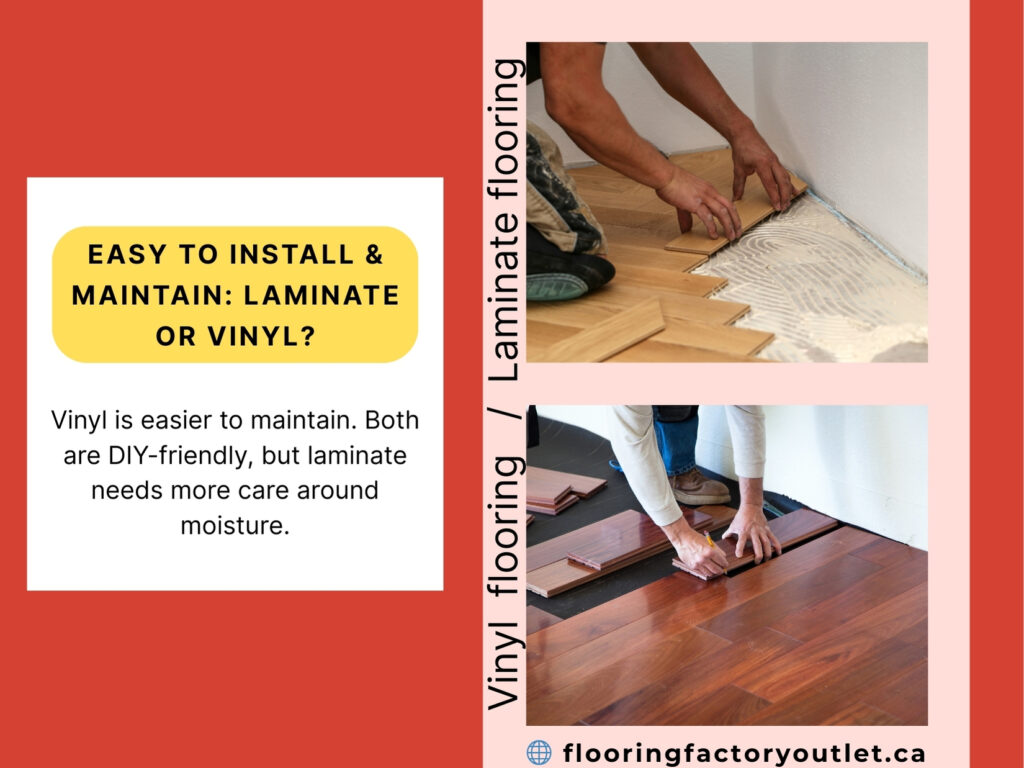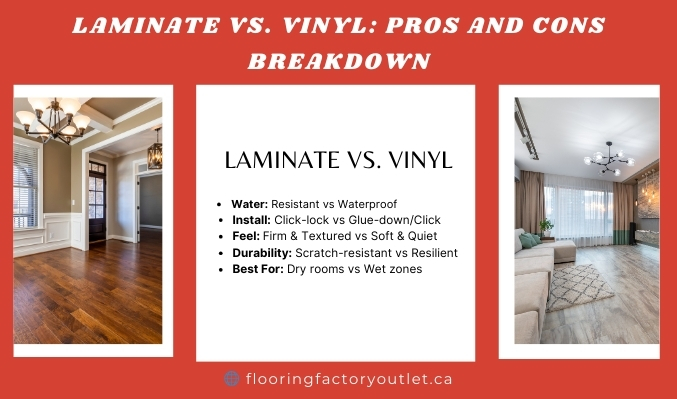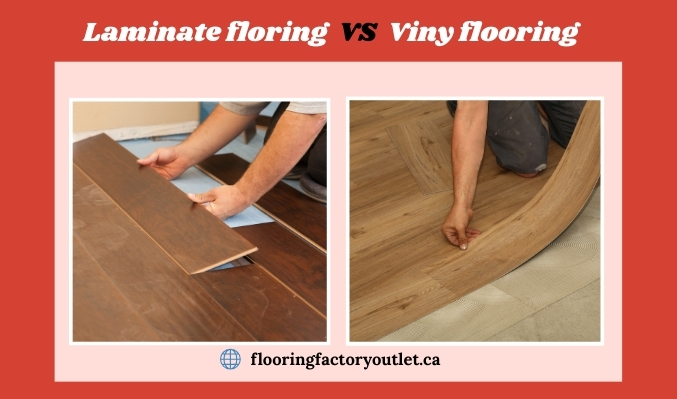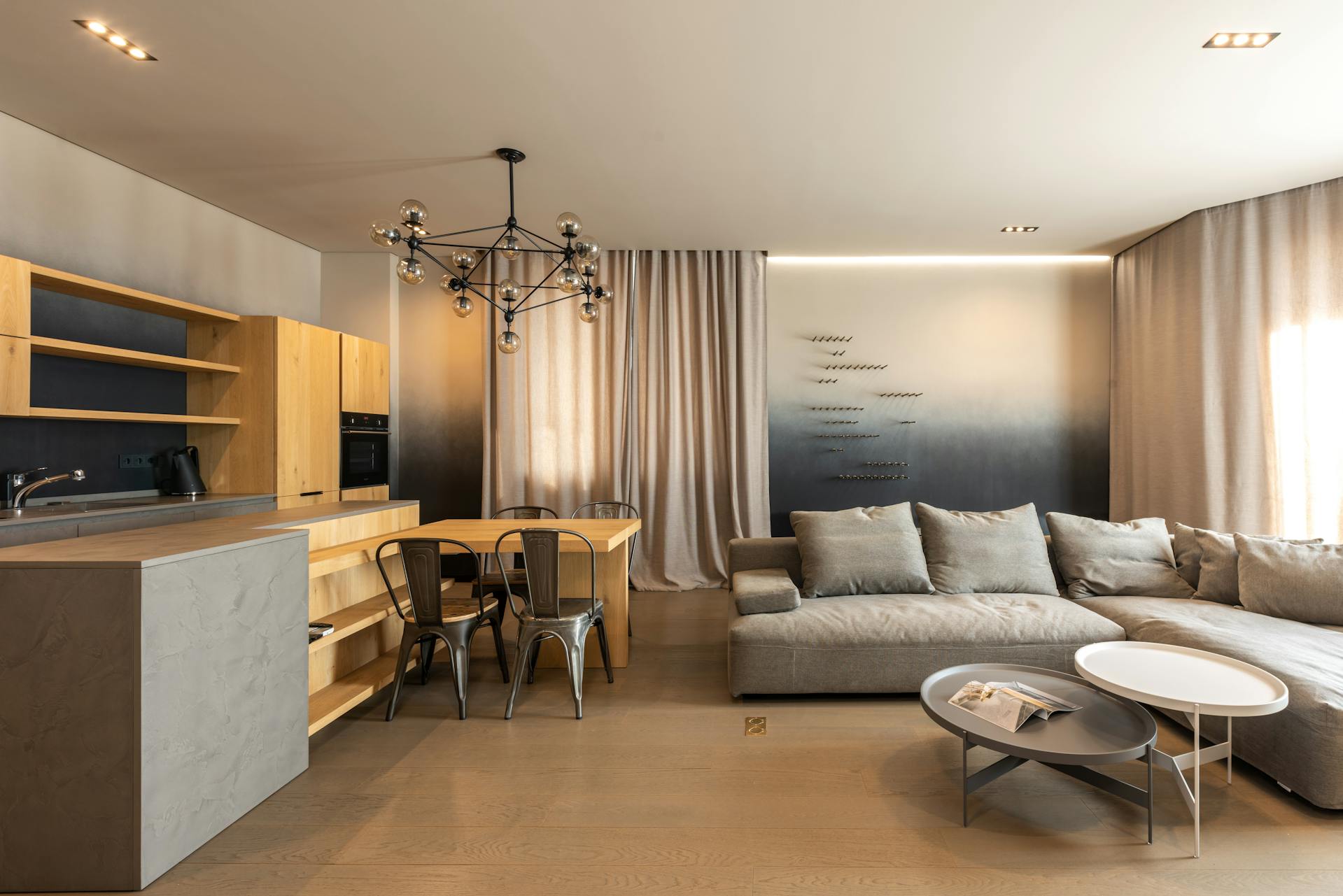At Flooring Factory Outlet, we understand that choosing the right flooring is important in making your house feel like a home. Whether you prefer the classic look of laminate or the durable, easy-care nature of vinyl, we’re here to help you find the perfect fit. Our goal is to make the decision easier for you, so you can choose the flooring that works best for your style and needs.
What Are Vinyl and Laminate Floors Made From?
Understanding the Core Materials
Vinyl flooring is made primarily from synthetic materials like polyvinyl chloride (PVC), which gives it flexibility and water resistance. Laminate flooring, on the other hand, is composed of a fiberboard core topped with a printed layer that mimics wood, stone, or tile, covered by a protective layer for durability.
How Each Type is Constructed
Vinyl flooring is typically available in sheets, planks, or tiles. The layers in vinyl flooring provide moisture resistance, making it a great choice for wet areas like bathrooms and kitchens. Laminate flooring consists of several layers: a moisture-resistant core, a printed image layer for design, and a hard protective top layer that prevents damage.
Durability and Feel Underfoot
Vinyl is softer and more flexible underfoot, offering a cushiony feel, while laminate is firmer but still quite durable. Both are designed to resist wear and tear, but laminate tends to have a more solid, rigid feel compared to vinyl’s more flexible surface.
Where Should You Install Vinyl or Laminate Flooring?
Best Rooms for Vinyl
Vinyl’s water resistance makes it perfect for areas like bathrooms, kitchens, and basements. It can handle spills and high moisture without warping or getting damaged, making it ideal for wet areas.
Ideal Areas for Laminate
Laminate works best in areas with moderate foot traffic, like living rooms, bedrooms, and hallways. It’s durable but not as water-resistant as vinyl, so it’s better suited for dry areas that don’t see a lot of moisture.
Moisture and Subfloor Considerations
Vinyl is better suited for moist environments, while laminate flooring requires a dry, clean subfloor. If not sealed properly, water exposure can affect laminate, causing it to swell or warp.
How Do They Handle Water, Scratches, and Stains?
Water Resistance Comparison
Vinyl flooring is highly resistant to water and won’t warp or swell if exposed to moisture. Laminate, however, is not as water-resistant and can absorb moisture if spills aren’t cleaned up quickly.
Scratch and Dent Resistance
Laminate flooring is often more scratch and dent-resistant than vinyl. Its hard top layer can handle heavy foot traffic and furniture without showing damage. Vinyl flooring is durable, too, but may show wear more easily over time.
Kid and Pet Friendliness
Both flooring types are generally kid- and pet-friendly, but vinyl tends to be a better option for homes with pets due to its superior water resistance. Laminate’s surface can be more prone to scratches from pet claws.
Which Flooring Type Is Easier to Install and Maintain?

Installation Methods
Vinyl flooring is easier to install, especially when opting for peel-and-stick tiles or click-lock planks. Laminate flooring may require more time and precision, especially with traditional glue-down or snap-together methods.
Tools and Skills Required
For vinyl, you can typically get away with basic tools like a utility knife for cutting and a straightedge. Laminate installation may require a saw and extra skills to cut precise edges and fit the pieces together correctly.
Long-term Care and Cleaning Tips
Both types are easy to clean, but vinyl requires less maintenance overall. Regular sweeping or vacuuming and occasional damp mopping will keep vinyl looking great. Laminate requires similar care, but you should avoid excessive water, as it can seep into the seams and cause damage.
How Do Vinyl and Laminate Compare in Terms of Style and Appearance?
Realism and Texture
Laminate flooring tends to offer more realistic textures and finishes, especially when it comes to mimicking the look of wood, stone, or tile. Vinyl, while versatile, may not always provide the same depth of texture as laminate.
Color and Design Options
Both flooring types offer a wide range of colors and designs. Vinyl is available in a variety of finishes, from wood to tile looks, while laminate also offers a large selection of realistic patterns and designs.
Matching Your Interior Style
Vinyl flooring is a great choice for modern or contemporary interiors, and its water resistance makes it perfect for kitchens or bathrooms. Laminate fits well with traditional and rustic styles due to its wood-like finishes.
Laminate vs. Vinyl: Pros and Cons Breakdown

| Feature | Laminate Flooring | Vinyl Flooring |
| Water Resistance | Water-resistant (some types) | Fully waterproof |
| Durability | Very durable, scratch-resistant | Highly durable and resilient |
| Installation | Click-lock, easy to install | Click-lock or glue-down |
| Best For | Dry areas like bedrooms, living rooms | Wet zones like kitchens, bathrooms |
| Comfort | Firm feel with realistic texture | Softer underfoot and quieter |
When comparing laminate vs vinyl flooring pros and cons, your final decision depends on the room’s purpose, moisture level, and desired feel.
Laminate or Vinyl – Which One Is More Budget-Friendly?
Upfront Cost Differences
Laminate flooring is cheaper than vinyl upfront. However, the cost can vary depending on the quality of the materials and the complexity of the installation.
Long-term Value and Warranties
Vinyl’s water resistance and durability give it a higher long-term value, especially in high-moisture areas. Laminate offers great durability in dry spaces but may need replacing sooner than vinyl if exposed to moisture. Both types come with warranties, typically ranging from 10 to 25 years.
Cost of Professional Installation vs DIY
While both types of flooring can be installed as DIY projects, professional installation costs will vary based on location and the job’s complexity. Laminate may require more precise installation, while vinyl is easier for DIYers to handle.
Laminate vs. Vinyl Flooring: Choosing What’s Best for You
At Flooring Factory Outlet, we make it easy to find the right flooring for your home. Whether you prefer the classic look of laminate or the durable, water-resistant nature of vinyl, we’re here to help. Explore our wide selection of laminate and vinyl options and let us guide you to the perfect choice. Request a personalized quote or get a free estimate today.
Frequently Asked Questions: Vinyl vs. Laminate Flooring
Vinyl flooring is entirely synthetic, typically made from PVC, making it highly water-resistant and suitable for moisture-prone areas. Laminate flooring consists of a wood-based core with a photographic layer, offering a realistic wood appearance but less water resistance.
Vinyl flooring is more water-resistant than laminate. Its synthetic composition allows it to withstand moisture, making it ideal for bathrooms, kitchens, and basements. Laminate, with its wood-based core, is more susceptible to water damage.
Both vinyl and laminate flooring are designed for easy installation. Laminate flooring typically uses a click-lock system, allowing it to float over the subfloor. Vinyl flooring offers more versatility, with click-lock, glue-down, or peel-and-stick installation options.
Both flooring options are budget-friendly. Laminate flooring often has a lower upfront cost, while vinyl flooring may offer better long-term value due to its water resistance and durability.
Vinyl flooring is generally better for homes with pets due to its water resistance and ease of cleaning. Laminate flooring can be more prone to water damage from pet accidents, but it offers better scratch resistance.
Both flooring types are relatively easy to maintain. Regular sweeping and occasional damp mopping are sufficient. However, to prevent damage, it’s important to avoid excessive water when cleaning laminate flooring.


